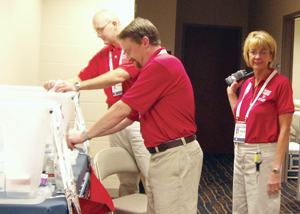When the U.S. Olympic Swim Trials return to Omaha this month, faculty and staff from UNMC, UNMC Physicians and The Nebraska Medical Center will be on hand to ensure the Olympic hopefuls are able to compete at their best.
More than 160 individuals from across the organization have volunteered to help with the trials. The volunteers include physicians, physical therapists, pharmacists and other staff members.

|
| Chad Vokoun, M.D., Sean McGarry, M.D., and Mary Peterson, prepare for the swim trials. |
The volunteers will work both the Swimvitational — a test event that takes place this weekend — and the trials, which run from June 22 through July 2. Organizers expect more than 1,800 athletes to attend the trials.
“It was certainly an honor to be invited again to provide services at the event,” said Dean Collier, Ph.D., UNMC College of Pharmacy assistant professor and one of the volunteers. “This is an opportunity to learn about sports medicine at an elite level.”
Second time around
Some volunteers — including orthopaedic surgeon Mark Dietrich, M.D. — also helped at the 2008 swim trials in Omaha. That experience is invaluable, Dr. Dietrich said.
The volunteers learned at the last swim trials that the busiest times for the volunteers is first thing in the morning before the races begin and at the end of the day when the swimming ends.
What ails them
The physicians and staff see swimmers with ailments such as upper respiratory infections, muscle strains, sprains and hip and shoulder injuries.
“A lot of the injuries we will see are the nagging ones, such as a shoulder that’s been bothering them for six months, because they didn’t stop their training regimen to get better,” said Jason Roberts, physical therapist at The Nebraska Medical Center. “When they come see us, our goal is to keep them moving so they can compete at their highest level.”
‘Just another patient’
Working with such high caliber athletes could leave the volunteers a little awestruck.
“There’s definitely a wow factor when you first walk into the arena and see the pool and the athletes,” Roberts said. “But, once that first swimmer comes through your door … they become another patient you’re treating.”
